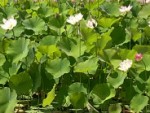
The lotus is associated with Job in the Bible and some scholars have identified it as Nelumbo nucifera, the sacred lotus of Egyptian fame. It is an aquatic perennial native to tropical Asia and Australia, and has been cultivated in China for over 3000 years for its ornamental medicinal and culinary value. The plants are anchored in the mud by a rhizome that spreads and form colonies. The green waxy leaves are up to two feet across and are held above the surface of the water on stems (petioles) up to 6 feet long that are attached to the center of the leaf-back. The cup-shaped pink or white flowers are eight to twelve inches across and are produced on erect stems above the foliage. They open during the day and close at night over a period of about three days. In the center of each flower is an inverse-cone receptacle that is two to three inches across and bears the nut-like seeds. The receptacle, which differentiates lotus from water lily, becomes woody and is valued for dried arrangements. The seeds are very long lived and 1300 year old seeds found in China have been germinated.
Job 40: (NLT) Sacred lotus may be the plant mentioned in Job when God asks Job if he can control the behemoth, a semi- aquatic quadraped, which he describes. The same passages, however, are also translated using lotus trees, lotus bushes, or shady trees and so may refer to some other plant.
“ Shepherd, O God, your people with your staff, your dear and precious flock. Uniquely yours in a grove of trees, centered in lotus land. Let them graze in lush Bashan as in the old days in green Gilead. “
Lotus plants like full sun and organically rich, calm water in USDA hardiness zones 4-10. They are generally healthy but are susceptile to aphids and red spiders. Reproduction is by seed. Plants are suitable for the margin of a pond or other body of water and are often planted in containers so the plants can easily be moved for aesthetic or practical reasons.
The genus name, Nelumbo, is the Sinhalese name for the plant. The specific epithet, nucifera, comes from the Latin word nux, meaning nut, and ferre meaning to bear and refers to the fruit of the plant.